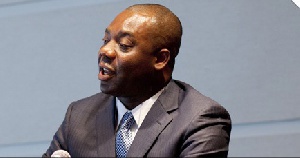The Member of Parliament for Manhyia South, Dr Mathew Opoku- Prempeh, said government must make the Savanna Accelerated Development Authority (SADA) project a national agenda rather than a northern venture otherwise it would not succeed.
He said the SADA would fail in its core mandate if the character of the project was not nationalized, urging a change in the perception that the initiative was northern-people-centered.
“Failure to make SADA a national agenda will affect the true sense of the Authority,” he said.
Dr Opoku- Prempeh expressed these views when the Acting SADA Chief Executive Officer, Mr Charles Abugri, met Parliamentarians to give an appraisal of ongoing measures to strengthen the institution to make it efficient and accountable.
The Authority is going through a period of intense restructuring, that would enable it to attract the necessary investment in the Savanna Ecological Zones of Ghana, and to position the institution to achieve its crucial strategic objectives as mandated by Act 805, 2010.
The meeting also discussed, among other things, the upcoming investment forum to be held in Tamale, the Northern Regional capital from March 24 to March 28, 2015.
Dr Opoku-Prempeh said he was deeply concerned about the development of northern Ghana because there was the extreme need to bridge the development gap between north and the south.
He said SADA should not only engage MP’s and people from its operational areas but seek other views that would inure to the benefit of the Authority’s work.
The legislators commended the efforts of the Acting SADA CEO for involving the Legislature in the restructuring process of the Authority.
They contended that since the Law on the SADA was passed in Parliament, the Authority had not sought their input towards the success of that institution, and praised Mr Abugri for his keenness to strengthen the image and effectiveness of the Authority.
Mr Abugri told the Parliamentarians that the new SADA leadership had began the process of re-engaging its constituencies and stakeholders with the view to rebuild trust after the institution was cast largely in the shadow of incompetence and misappropriation of public funds.
He said the institution had begun an action to respond effectively to the issues raised by the Audit Report relating to accountability deficits and misapplication of public funds as instructed by President John Mahama.
According to him, the SADA Board had made it its top priority to bring closure to the many issues raised in the SADA Audit Report and was planning to issue its report and recommendations soon, adding that it was determined to recover monies where the findings suggest misapplication.
Mr Abugri said the Authority had decided to change its way of working, having approved a new organogram, and was in the process of obtaining the necessary permissions to recruit critical staff, with SADA’s development partners making specific financial and technical commitments in the areas of institutional building, technical expertise and transport.
He said the primary focus of SADA was to build its ability to deliver on its mandate, addressing the infrastructure problem, facilitate private investment and business development in the Savanna zones, and develope the next five-year implementation plan to strengthen partnership with stakeholders and Parliament.
He appealed to the Parliamentarians to lend legislative support for Public Private Partnership projects, international partnerships for which the law requires Parliamentary approval and for approval of its annual budgetary appropriation to ensure accelerated development and reduce the development parities in Ghana.
Mr Joseph Yieleh Chireh, MP for Wa West, urged the new board to concentrate on solving the problems they inherited and to remain focused in achieving the core mandate of the Authority even as it mobilised resources for the implementation of programmes.
He said after passing the SADA Law, MPs had expected some form of orientation from the Authority which never came, indicating that it was worthwhile that the new leadership had found it expedient to engage legislators on the goings-on of the institution.
Prof. Gyan Baffour, the Member of Parliament for Wenchi, advised the Authority not to base the recruitment of technical teams on regional basis but rather engage competent and qualified personnel for the effective management of SADA.
The MP for Damongo, Mr Mutawakilu Adam said SADA’s programmes, apart from bridging the infrastructural development gap between the north and south, should focus on educating the people towards owning the project.
Former Majority Leader and MP for Zebilla, Cletus Avoka, advised the SADA to commit its limited resources to building short, medium and long term measures that would help achieve the development of its operational areas.
General News of Saturday, 28 February 2015
Source: GNA













